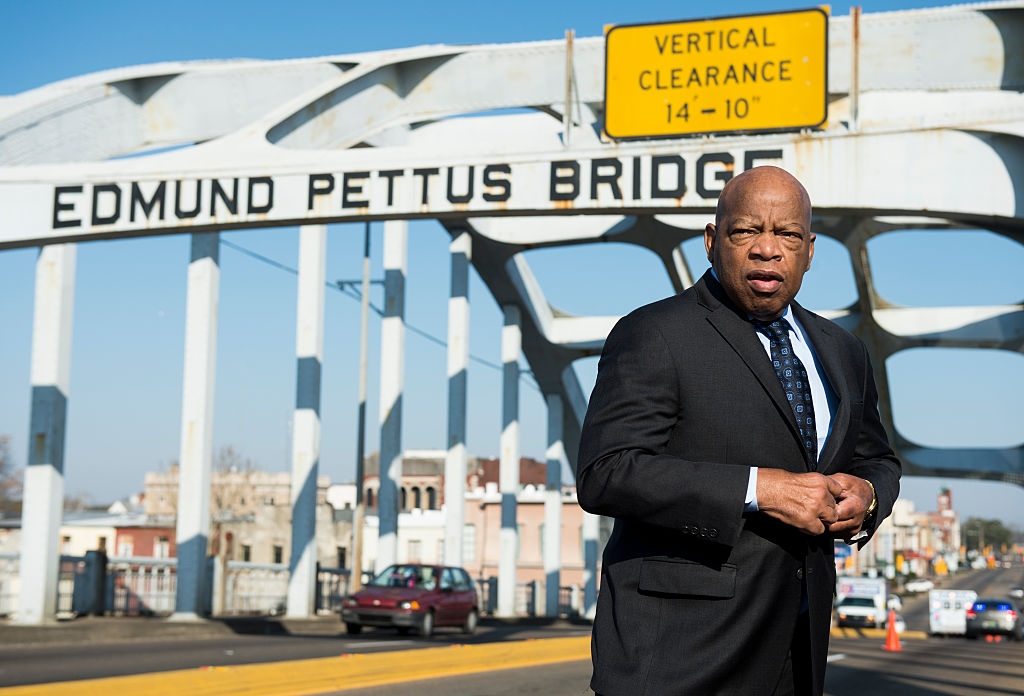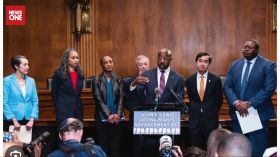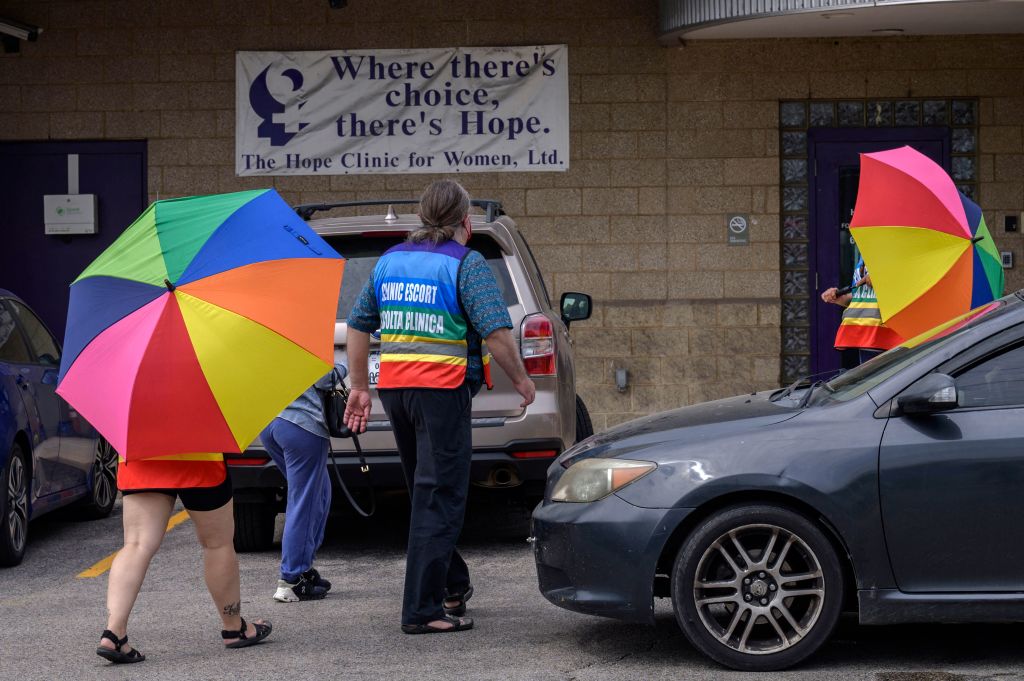
Rep. John Lewis, D-Ga., stands on the Edmund Pettus Bridge in Selma, Ala., on Feb. 14, 2015. | Source: Bill Clark / Getty
UPDATED: 10:30 PM EST March 7, 2025
As we honor the life and legacy of the esteemed U.S. Rep. John Lewis, a longtime Congressman from Georgia and fearless champion of civil rights and voting equality who died almost 5 years ago on July 17, 2020, we must confront the persisting battle to safeguard and enhance these fundamental rights.
Both the John Lewis Voting Rights Advancement Act and the Freedom to Vote Act remain at a standstill. These two crucial pieces of legislation are aiming to safeguard voting rights.
The John Lewis Voting Rights Advancement Act and The Freedom to Vote Act
The John Lewis Voting Rights Advancement Act is a proposed law that seeks to strengthen and restore key provisions of the Voting Rights Act of 1965. aims to address the weaknesses created by a 2013 Supreme Court decision and protect the voting rights of all citizens, particularly those who have historically faced discrimination. Despite its significance, the act still faces hurdles in Congress.
The Freedom to Vote Act addresses voter suppression and campaign finance, aiming to expand access, enhance security, and promote fair representation. However, its primary goals are to expand access to voting, strengthen election security measures, and foster fair representation. Yet, it struggles to gain bipartisan support.
Voting rights empower Black individuals to address inequalities, promote justice, and create equal opportunities. Through voting, they can elect representatives who understand the challenges and can make progress when it comes to changing it.
Historically, the fight for voting rights has been a cornerstone of the civil rights movement. Black activists and leaders have made tremendous sacrifices to secure these fundamental rights. Voting empowers Black people to have a say in decisions that directly impact their lives, communities, and futures. It serves as a tool for challenging historically terrible practices. Voting allows the advancing of policies that address racial injustice, economic disparities, and so much more.
4 more years of Donald Trump
Nonetheless, protecting and expanding voting rights for Black people is not just about ensuring equal participation. But also about upholding the principles of democracy and fostering a more inclusive society for everyone.
However, as we prepare for another four years of Donald Trump, it’s crucial to acknowledge these icons in 2025 who are dedicated to fighting for voting rights. These leaders have clearly been inspired by the spirit of John Lewis. They work tirelessly to ensure equal access to the ballot and combat voter suppression.
These advocates serve as a powerful reminder of the significance of protecting voting rights as a cornerstone of a just and inclusive society. They are instrumental in upholding the principles of democracy and empowering every eligible citizen to participate in the process.
Here, we recognize 10 remarkable individuals who are carrying that tradition of making “good trouble” in the name of trying to secure voting rights.
1. Arekia Bennett
 Source:emersoncollective
Source:emersoncollective
Arekia Bennett, an Emerson Collective Fellow and executive director of Mississippi Votes, is leading the 1890 Project campaign to raise awareness about discriminatory voting laws in Mississippi and advocate for change in the state legislature, aiming to restore the ballot-measure process and empower young advocates for disenfranchised voters.
2. Damon Todd Hewitt
 Source:@DamonTHewitt
Source:@DamonTHewitt
Hewitt, as the acting president and executive director of the Lawyers’ Committee for Civil Rights Under Law, dedicates his efforts to combatting voter suppression and ensuring fair elections.
3. Derrick Johnson
 Source:Getty
Source:Getty
As the president and CEO of the NAACP, Johnson leads efforts to combat voter suppression through education, advocacy, and litigation, ensuring equal voting rights for all Americans.
4. LaTosha Brown and Cliff Albright
 Source:Getty
Source:Getty
As co-founders of Black Voters Matter Fund, Brown and Albright mobilize and empower Black voters, working to dismantle systemic barriers to voting.
5. Melanie L. Campbell
 Source:Getty
Source:Getty
Melanie Campbell, as the president and CEO of the National Coalition on Black Civic Participation, empowers marginalized communities and fights to safeguard their voting rights.
6. Marc Morial
 Source:Getty
Source:Getty
Serving as the president and CEO of the National Urban League, Morial is at the forefront of the battle against voter disenfranchisement, striving for a more equitable electoral system.
7. Nikema Williams
 Source:Georgia State Senate
Source:Georgia State Senate
Following in the footsteps of her predecessor, John Lewis, Williams continues to be a vocal advocate for voting rights as the U.S. Representative for Georgia’s 5th congressional district. She was also a member of the Georgia State Senate for the 39th district before her House campaign.
8. Rebekah Caruthers
 Source:https://www.fairelectionscenter.org/
Source:https://www.fairelectionscenter.org/
As the vice president of the Fair Elections Center, Caruthers actively works to expand access to the ballot box and challenge discriminatory practices, safeguarding the voting rights of all Americans.
9. Sherrilyn Ifill
 Source:Getty
Source:Getty
Sherrilyn Ifill was the former president and director-counsel of the NAACP Legal Defense and Educational Fund. Ifill tirelessly fights against voter suppression and advocates for equal access to the ballot box.
10. Stacey Abrams
 Source:Getty
Source:Getty
Renowned for her tireless efforts in voter registration and mobilization, Abrams fights against voter suppression and advocates for fair elections. She was a member of the Georgia House of Representatives from 2007 to 2017, serving as minority leader from 2011 to 2017.
























